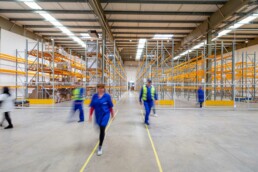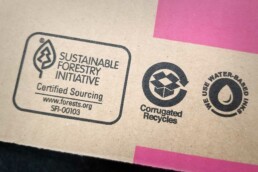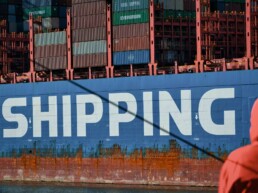The Future of Supply Chains: What’s Coming Next in Logistics Management
The landscape of supply chain management changes nearly every day. Global events, new technologies, shifts in consumer demand, and increased focus on sustainability continuously impact how products move from point A to point B. For third-party logistics providers (3PLs), staying on top of these developments is critical to remaining competitive and providing excellent Freight Forwarding, Warehousing and Distribution, and Fulfillment Services to clients.
So what’s on the horizon for 3PLs? Here are three key areas to pay attention to when preparing your Order Fulfillment Solutions and overall supply chain strategy for the coming years.
Embracing New Technologies

One major shift occurring in the future of supply chains is the integration of new technologies like artificial intelligence, machine learning, robotics, and more. As these innovations enable increased Warehouse Automation and higher efficiency, 3PLs need to determine how to best leverage them. For example, autonomous mobile robots can drastically improve productivity in fulfillment centers while also providing scalability to meet changing demands. 3PL Technology Solutions like transportation management systems (TMS) and cloud-based warehouse management systems (WMS) also bring opportunities to enhance visibility, reporting, optimization, and automation across supply chain activities.
Essentially, new technologies allow 3PLs to do more with less while also reacting faster to client needs and global events. However, implementation takes careful planning regarding integration requirements, change management, and how tech tools best support current Warehouse and Distribution processes. Additionally, as new innovations emerge, 3PLs must stay actively aware and be ready to evolve their capabilities.
Prioritizing Agility and Flexibility

With climate change and environmental impact becoming increasingly important to consumers, businesses must address sustainability across their operations. 3PLs are no exception, as many of their enterprise clients have made public commitments to reduce waste, emissions, and other areas. As a result, sustainability will become a key consideration and potential differentiating factor for many shippers when selecting Supply Chain partners.
Some important areas 3PLs should evaluate from a sustainability perspective include Packaging Optimization, evaluating energy sources in Warehousing operations, Investment in more fuel-efficient fleets, and providing transparency into emissions data tied to Shipping and Delivery. Building a Fulfillment Center certified through sustainability organizations like the EPA’s SmartWay Transport Partnership also signals dedication. Offering Reverse Logistics and re-commerce services allows reuse of materials, further reducing waste sent to landfills.
Essentially, all aspects of 3PL operations present opportunities to become better environmental stewards. Getting ahead in developing company-wide sustainability goals and measurable improvement plans will pay dividends with both new and existing clients.
Focusing on Sustainability

The future of supply chains has been changing in recent years, unforeseen disruptions like the COVID-19 pandemic and various geopolitical conflicts have highlighted the need for resilient, agile supply chains. As a result, businesses are looking to partners like 3PLs to help implement solutions that mitigate risk and adapt swiftly when the unexpected occurs.
Some ways 3PLs can build flexibility include expanding their Carrier Selection to have contingency plans when certain channels become unavailable. Diversifying Warehousing and Distribution across different geographic regions also limits exposure when localized disruptions occur. Additionally, strong relationships with suppliers allow 3PLs to stay aware of Inventory issues upstream and respond appropriately.
Ultimately, the 3PLs best positioned for long-term success will be those viewing adaptability and resilience as competitive advantages. Investment in infrastructure, technology, carrier partnerships, and inventory strategies is required to create responsive, customizable Order Fulfillment Solutions ready to handle whatever comes next.
Beginner’s Guide to Third-Party Logistics (3PL)
The world of e-commerce is always changing, understanding the roll of Third-Party Logistics is integral to keeping up. This beginner’s guide to third-party logistics (3PL) will delve into the essential aspects, offering insights into fulfillment services, warehousing, and much more.
Read More…
E-commerce businesses partnering with 3PLs must recognize the efects of adaptability, innovation, and sustainability in the future of supply chains. As disruptions, technological advancements, and sustainability imperatives reshape the logistics sphere, the onus falls on businesses to collaborate with 3PLs adept at embracing new technologies, prioritizing sustainable practices, and fortifying resilience. By investing in forward-looking strategies, harnessing robust technology solutions, and championing sustainability initiatives, e-commerce ventures stand to benefit from resilient and agile supply chains. These forward-thinking approaches not only fortify partnerships with 3PLs but also ensure readiness in navigating the dynamic challenges that lie ahead, fostering growth and success in the ever-evolving e-commerce ecosystem.”
Falcon Fulfillment focuses on these supply chain struggles and can help you keep your competitive edge.
Let’s Talk!
Related posts:
 The Secret Tool of Successful E-commerce Brands: An Introduction to Third-Party Logistics and Its Influence on E-commerce
The Secret Tool of Successful E-commerce Brands: An Introduction to Third-Party Logistics and Its Influence on E-commerce
 1PL, 2PL, 3PL, 4PL, 5PL: Logistics Providers Explained
1PL, 2PL, 3PL, 4PL, 5PL: Logistics Providers Explained
 Yellow Trucking Firm Bankruptcy: Impact on Logistics and Workers
Yellow Trucking Firm Bankruptcy: Impact on Logistics and Workers
 Estimating Demand Benefits Business: Advantages for Your Growth
Estimating Demand Benefits Business: Advantages for Your Growth

